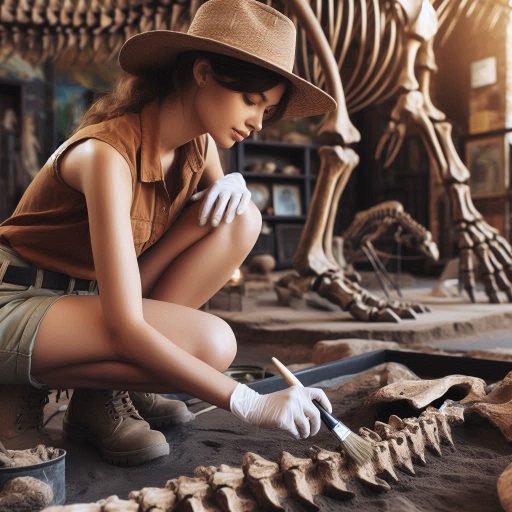Introduction
An archaeological consulting business is a specialized service that provides professional expertise in the assessment.
Preservation, and management of archaeological and cultural heritage sites.
These businesses offer a range of services, including archaeological surveys, site assessments, cultural resource management (CRM), and historical research.
They also ensure compliance with federal, state, and local laws regarding heritage preservation, particularly when development projects may impact historically significant sites.
Whether it’s assessing a construction site for historical significance or advising on the proper handling of artifacts, archaeological consulting firms are vital in protecting cultural resources during development and land-use planning.
The importance of archaeological consulting businesses in the field of archaeology cannot be overstated.
They serve as a critical link between developers, government agencies, and the preservation of our cultural heritage.
When land is being developed for infrastructure projects like roads, buildings, or pipelines, these businesses step in to ensure that no significant archaeological sites are destroyed or overlooked.
They also assist clients in understanding and complying with complex legal requirements, such as those related to the National Historic Preservation Act or the Archaeological Resources Protection Act.
Without the guidance of archaeological consultants, valuable historical and cultural information could be lost forever, which is why their role in balancing modern development with historical preservation is so crucial.
Research and Planning
Conduct Market Research to Identify Potential Clients and Competitors
Conducting market research is a vital first step in starting your archaeological consulting business.
Begin by identifying potential clients and competitors in your area.
Focus on industries like construction, real estate, government agencies, and environmental firms that frequently require archaeological assessments.
Analyze competitors to understand their strengths and weaknesses.
Look into their services, pricing models, and how they attract clients.
Understanding your competition helps you identify gaps in the market and differentiate your business.
Market research also allows you to predict demand for services and establish realistic revenue expectations.
Develop a Business Plan Outlining Services, Pricing, and Target Market
After completing your market research, develop a solid business plan that outlines your services, pricing, and target market.
Start by defining your core services.
Will you offer archaeological surveys, heritage management, excavation, or cultural resource management?
Clearly specifying your offerings helps target the right clients and focus your marketing.
Next, decide on a pricing structure.
Research how competitors charge for similar services.
Will you price per project, by the hour, or use a different model? Your prices should be competitive while also covering your costs and ensuring profitability.
Lastly, identify your target market.
Focus on the specific industries or geographic areas where demand for your services is highest.
Tailor your marketing efforts to reach these potential clients, positioning your business as the best solution for their archaeological consulting needs.
Obtain Necessary Permits and Licenses for Operating an Archaeological Consulting Business
Before you can legally operate an archaeological consulting business, you must obtain the necessary permits and licenses.
Requirements vary by location, but you‘ll likely need permits to conduct archaeological work, especially on protected sites or land with historical significance.
In some regions, certification in archaeology or a related field is required to perform consulting services.
Check local and national regulations to ensure full compliance.
You may also need a general business license and insurance, including liability insurance, to protect your business.
Proper documentation helps you avoid legal issues and build trust with clients who expect professional services.
Being fully licensed and insured also gives your business credibility and shows that you operate in accordance with legal and ethical standards.
By thoroughly researching your market, developing a detailed business plan, and ensuring all permits and licenses are in place, you lay a strong foundation for your archaeological consulting business.
Read: What Does a Geologist Do? Career Overview and Insights
Building Expertise and Credibility
To succeed in the archaeological consulting business, building expertise and credibility is essential.
Hiring experienced professionals, staying current with industry trends, and forming valuable partnerships are key strategies to gain trust and ensure success.
Hire Experienced Archaeologists to Ensure High-Quality Services
One of the most important steps in building credibility is hiring experienced archaeologists.
Skilled professionals with field experience will ensure the quality of your services.
Clients rely on your team‘s expertise for accurate assessments and compliance with regulations.
Experienced staff also bring valuable insights, enhancing your ability to offer a wide range of services like site excavation.
Artifact analysis, and cultural resource management.
Look for archaeologists with specific expertise related to your niche, whether it‘s prehistoric, historic, or environmental archaeology.
This specialized knowledge helps you tailor your services and meet the specific needs of each project.
An experienced team also improves your reputation in the industry, making it easier to attract new clients and retain existing ones.
Participate in Professional Development Opportunities to Stay Current with Industry Trends
To stay competitive, it‘s crucial to participate in ongoing professional development.
Archaeology is an evolving field, with new technologies, methods, and regulations frequently emerging.
Attending workshops, conferences, and training sessions helps your team stay up-to-date with the latest trends and tools.
For example, advancements in remote sensing technology, Geographic Information Systems (GIS), or carbon dating can significantly improve the accuracy and efficiency of archaeological work.
Additionally, being active in professional organizations such as the Society for American Archaeology (SAA) or the European Association of Archaeologists (EAA) boosts your business‘s credibility.
These associations often provide networking opportunities and access to new research, which can help you stay ahead of the competition and refine your service offerings.
Establish Partnerships with Universities or Research Institutions to Enhance Credibility
Forming partnerships with universities or research institutions adds an extra layer of credibility to your business.
These collaborations can lead to joint projects, research opportunities, and even access to cutting-edge technologies.
Partnering with academic institutions allows your business to gain insights from leading experts and stay on the cutting edge of archaeological research.
Such partnerships also demonstrate your commitment to advancing the field of archaeology, not just providing services.
Clients often view these collaborations as a mark of trustworthiness and professionalism.
Engaging in research projects or offering internships to students further solidifies your reputation and connects you with a talent pipeline for future hires.
By hiring experienced staff, investing in professional development, and collaborating with respected institutions, you can build the expertise and credibility needed to succeed in the competitive field of archaeological consulting.
Read: Educational Path: Becoming a Geologist in the USA
Marketing and Branding
Marketing and branding are critical components of growing a successful archaeological consulting business.
Establishing a strong online presence, attending industry events, and developing a unique brand identity will help you attract clients and stand out in the competitive market.
Create a Website and Social Media Presence to Promote the Business
Creating a professional website and maintaining an active social media presence is essential for promoting your business.
Your website should clearly outline your services, showcase previous projects, and provide contact information.
Ensure that it is user-friendly, mobile-responsive, and optimized for search engines so potential clients can easily find you.
Include testimonials from satisfied clients and case studies to demonstrate your expertise and build trust.
Social media platforms like LinkedIn, Facebook, and Instagram offer excellent opportunities to share updates on ongoing projects, industry news, and archaeological insights.
Consistent online engagement helps build your brand and expand your reach, allowing potential clients to learn more about your services and connect with you directly
Attend Industry Conferences and Networking Events to Connect with Potential Clients
Attending industry conferences and networking events is a powerful way to meet potential clients and build valuable relationships.
Events like archaeological conferences, environmental seminars, and construction expos allow you to showcase your expertise and learn about upcoming projects that may require your services.
Networking in person strengthens your credibility and creates opportunities for collaborations.
When attending events, bring business cards, brochures, or other promotional materials that highlight your services and accomplishments.
Participate in panel discussions, workshops, or even host presentations to further establish your authority in the field.
Additionally, connecting with professionals from related industries, such as construction, heritage conservation, and urban planning, can lead to referral opportunities and long-term partnerships.
Develop a Strong Brand Identity to Differentiate the Business from Competitors
A strong brand identity sets your archaeological consulting business apart from competitors.
Begin by defining your company‘s core values, mission, and vision.
What makes your services unique? Whether it‘s your commitment to sustainable practices, expertise in a specific archaeological field, or a client-centered approach, your brand should communicate a clear message to your audience.
Create a memorable logo, choose consistent colors and fonts, and develop a professional tone of voice for all marketing materials.
Your brand should reflect professionalism, reliability, and expertise.
Use these elements across all platforms‘your website, social media, business cards, and presentations‘to create a cohesive and recognizable brand.
By combining a strong online presence, active participation in industry events, and a distinct brand identity.
You will effectively market your archaeological consulting business, attract new clients, and build a reputable name in the industry.
Read: Botany Career Fairs and Networking Events

Securing Projects
Securing projects is crucial to the success of your archaeological consulting business.
Reaching out to potential clients, submitting proposals, and negotiating contracts are essential steps to win and sustain business.
Reach Out to Potential Clients Through Cold Calling, Emails, and Networking
Actively reaching out to potential clients is an important strategy for securing projects.
Cold calling, sending personalized emails, and leveraging your professional network can open doors to new opportunities.
Research companies and industries likely to need archaeological consulting services, such as construction firms, government agencies, or environmental organizations.
Tailor your communication to highlight how your expertise can solve their specific challenges or meet their compliance requirements.
Networking is another powerful tool.
Attend local business events, industry conferences, and public archaeology lectures where potential clients may be present.
Personal interactions help build trust and allow you to explain the value of your services in person.
Maintaining regular contact with prospective clients keeps you on their radar for future projects.
Submit Proposals for Archaeological Consulting Projects
Once you’ve established contact with potential clients, submitting detailed and professional proposals is the next step in securing projects.
A well-crafted proposal outlines the scope of work, methodology, timeline, and costs.
Clearly explain how your archaeological consulting services will meet their project‘s needs, whether it‘s for compliance with heritage laws, environmental assessments, or excavation services.
Tailor each proposal to the specific project and client, highlighting relevant experience and past successes.
Use a professional format that reflects your brand and expertise.
A strong proposal not only demonstrates your technical capabilities but also builds confidence in your ability to deliver high-quality results within the agreed timeline and budget.
Negotiate Contracts and Agreements with Clients
Once a client accepts your proposal, contract negotiation is the next critical step.
Contracts should clearly define the terms of the agreement, including deliverables, timelines, payment terms, and contingencies.
Ensure the contract protects both parties and avoids potential disputes.
Be transparent about pricing and ensure all project details, including costs for unforeseen issues, are clearly outlined.
It‘s essential to negotiate contracts that align with your business goals while meeting the client’s budget and project requirements.
This process may involve compromising on certain terms, but always ensure the contract is fair and sustainable for your business.
Building strong client relationships during negotiations can lead to repeat business and referrals.
By effectively reaching out to clients, submitting compelling proposals, and negotiating clear contracts, you can secure consistent archaeological consulting projects, grow your business, and establish a reputation for reliability and excellence in the field.
Read: Botany Career Fairs and Networking Events
Transform Your Career Today
Unlock a personalized career strategy that drives real results. Get tailored advice and a roadmap designed just for you.
Start NowLearn More: Top Skills Needed for a Successful Pharmacology Career
Uncover the Details: Astronomy Internships and Early Career Opportunities
Managing Finances and Operations
Efficiently managing finances and operations is vital for the success of your archaeological consulting business.
Establishing a solid financial system, hiring administrative staff, and regularly evaluating your business‘s financial performance are key components of effective management.
Set Up a System for Invoicing, Bookkeeping, and Budgeting
Establishing a reliable system for invoicing, bookkeeping, and budgeting is essential for smooth financial operations.
Start by choosing accounting software that fits your business needs.
Options like QuickBooks, FreshBooks, or Xero can streamline your financial processes.
These tools allow you to create invoices, track expenses, and monitor cash flow effectively.
Create a standardized invoicing process to ensure timely payments.
Clearly outline payment terms, due dates, and accepted payment methods on each invoice.
Regularly update your bookkeeping records to keep track of income and expenses.
This will help you maintain a clear picture of your financial health.
Additionally, set a budget that outlines projected income and expenses for your business.
Regularly review and adjust this budget as necessary to reflect changes in projects, client needs, and operational costs.
A well-maintained financial system helps you manage resources effectively and avoid cash flow issues.
Hire Administrative Staff to Manage Day-to-Day Operations
As your archaeological consulting business grows, hiring administrative staff becomes crucial for managing day-to-day operations.
Administrative personnel can handle tasks such as scheduling, client communications, and project management, allowing you to focus on your core consulting services.
When hiring, look for individuals with strong organizational and communication skills.
They should be familiar with the specific needs of the archaeological field and understand how to support project workflows.
Having dedicated administrative staff helps improve overall efficiency and ensures that your business runs smoothly.
This delegation allows you to concentrate on strategic planning and client relationships, ultimately driving the growth of your business.
Additionally, well-organized administrative processes enhance client satisfaction, as timely communication and project updates create a positive experience.
Evaluate the Business’s Financial Performance Regularly to Ensure Profitability
Regular evaluation of your business‘s financial performance is essential to ensure profitability.
Set a routine for reviewing financial statements, including income statements, balance sheets, and cash flow reports.
Analyze key performance indicators (KPIs) such as revenue growth, profit margins, and project costs.
Assess whether your projects are meeting profitability targets and identify areas where you can improve.
This might include adjusting pricing strategies, reducing operational costs, or exploring new revenue streams.
Consistent financial reviews help you make informed decisions that drive the success of your business.
Additionally, consider seeking the advice of a financial advisor or accountant.
Their expertise can provide valuable insights into optimizing your financial strategy and ensuring your business remains profitable.
By setting up a robust financial system, hiring administrative support, and regularly evaluating your financial performance.
You can effectively manage the operations of your archaeological consulting business, leading to sustainable growth and long-term success.
Providing High-Quality Services
Delivering high-quality services is fundamental to the success of your archaeological consulting business.
By conducting thorough research, communicating findings effectively, and maintaining ethical standards, you can ensure client satisfaction and build a solid reputation in the industry.
Conduct Thorough Research and Analysis for All Projects
Conducting thorough research and analysis is the backbone of high-quality archaeological consulting.
Each project requires a detailed understanding of the site, its historical context, and relevant regulations.
Start with comprehensive background research to gather existing data, historical records, and previous archaeological findings related to the site.
Utilize a variety of methods, such as field surveys, excavations, and geophysical techniques, to gather data.
Employ modern technologies, such as GIS and remote sensing, to enhance your analysis and provide more accurate assessments.
Thorough research not only helps in compliance with regulatory requirements but also ensures that your findings are robust and reliable.
Clients depend on your expertise to make informed decisions about their projects.
A commitment to detailed and accurate research establishes your credibility and enhances the quality of your services.
Communicate Findings Effectively to Clients Through Reports and Presentations
Once research and analysis are complete, effectively communicating your findings to clients is crucial.
Develop comprehensive reports that summarize the objectives, methodologies, and results of each project.
Use clear, concise language and include visual aids such as charts, maps, and photographs to enhance understanding.
Tailor your presentations to the audience, focusing on key findings and recommendations that address the client’s specific needs.
When presenting, be prepared to answer questions and engage in discussions.
Effective communication builds trust and demonstrates your expertise, making clients feel confident in your services.
Regular updates during the project can also keep clients informed and involved.
This transparency fosters positive relationships and encourages repeat business.
Maintain High Ethical Standards and Comply with All Industry Regulations
Upholding high ethical standards is paramount in archaeological consulting.
Adhere to all industry regulations, such as the National Historic Preservation Act, local laws, and professional guidelines.
Compliance not only protects cultural resources but also enhances your business‘s reputation.
Implement a code of ethics that emphasizes integrity, respect for cultural heritage, and responsible stewardship.
Educate your team about ethical practices, ensuring everyone understands the importance of compliance and integrity in their work.
Maintaining high ethical standards will build trust with clients and stakeholders.
A reputation for ethical conduct can differentiate your business in a competitive market and attract clients who value responsible practices.
By conducting thorough research, communicating findings effectively, and maintaining high ethical standards, you can provide high-quality services that meet client expectations.
This commitment to excellence will establish your archaeological consulting business as a trusted leader in the industry.
Explore Further: How to Publish Your Microbiology Research Paper
Conclusion
Starting an archaeological consulting business requires careful planning and execution.
Begin by creating a detailed business plan that outlines the services you’ll offer, such as site assessments, cultural resource management, or historical research.
Clearly identify your target market, which could include developers, government agencies, or private landowners.
Setting well-defined goals for your business will help guide your growth.
Next, secure the necessary licenses, certifications, and insurance required for operating legally in your region.
These steps are essential to build credibility and protect your business.
Building a strong network is key to success.
Attend industry conferences, join professional organizations, and promote your expertise through marketing efforts.
Collaboration with other consultants, archaeologists, and professionals will expand your client base and open up new opportunities.
Additionally, investing in the latest tools and technology, such as GIS software and remote sensing devices, will allow you to deliver high-quality services to clients.
For aspiring entrepreneurs with a passion for archaeology, this career path is both rewarding and impactful.
Starting your own business combines the thrill of fieldwork with the satisfaction of contributing to the preservation of history.
The entrepreneurial aspect offers the flexibility to shape your career according to your vision and passion.
Take the leap, and pursue your dream of building a thriving archaeological consulting business.
It‘s an opportunity to turn your passion into a profession while making a real difference.
[E-Books for Sale]
The Big Book of 500 High-Paying Jobs in America: Unlock Your Earning Potential
$19.99 • 500 High-Paying Jobs • 330 pages
Explore 500 high-paying jobs in America and learn how to boost your career, earn more, and achieve success!
See All 500 High-Paying Jobs of this E-Book
1001 Professions Without a Degree: High-Paying American Jobs You Can Start Now
$19.99 • 1001 Professions Without a Degree • 174 pages
Discover 1001 high-paying jobs without a degree! Unlock career tips, skills, and success strategies for just $19.99!




